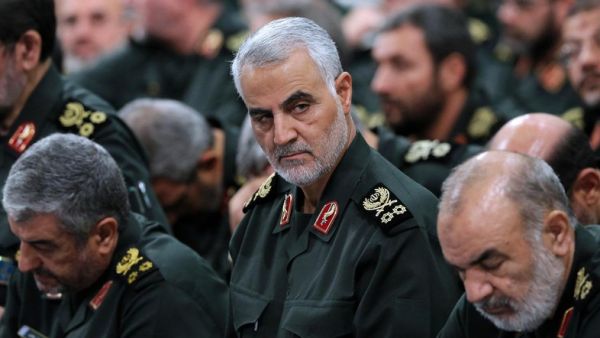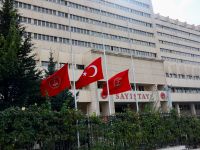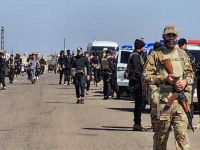- As Iraqi Kurdish dreams from independence crumble, an Iranian General stands out as a key player
- Qassem Suleimani represented Tehran in negotiations with the Kurdish PUK party
- The deal was reportedely misrepresented to the other Kurdish political party, the KDP in a "historic betrayal"
- Suleimani is looking to extend Tehran's influence in the region
By Ty Joplin
A "Historic Betrayal”
While some Iraqi Kurds were busy preparing to vote for independence from Baghdad, others quietly met with Iranian officials hell-bent on seeing the dream of Kurdish independence fail.
In what was called a “historic betrayal,” by an anonymous senior Kurdish official, the second-largest Kurdish political party in Iraq, the Patriotic Union of Kurdistan (PUK), secretly made a deal with Iranian general Qassem Suleimani to ensure that Kurdistan would yield to Baghdad and Tehran, all but sabotaging the political aspirations of the Kurdish Democratic Party (KDP), the largest Kurdish party in Iraq and the rival of the PUK.
In 2014, when ISIS seized vast swaths of territory in central and northern Iraq, Kurdish leadership saw a rare opportunity. Iraqi forces abandoned their posts in Iraq’s oil-rich Kirkuk region, and Kurdish peshmerga troops swept in, laying claim to much of Iraq’s oil in a bid to become economically viable enough to administer their own state.
Now, after three years of incremental gains along Iraq’s frontier, the Iraqi army with Shia militias organized and supported by Iran have retaken virtually all of the Kurd’s gains with little resistance. All that was painstakingly gained in three years and a national referendum to move towards independence was lost in one week, and amidst the chaos stands Iranian General Suleimani, who cemented the wedge between the PUK and the KDP.
So who is General Qassim Suleimani?
Qassem Suleimani, AFP/File
For most of his life, Suleimani has been a shadowy figure in Iranian politics. He is the leader of the Quds Force, a covert special forces unit that has been reportedly involved in the plot to assassinate the Saudi ambassador to the United States, Adel al-Jubeir, and even reportedly trained Colombian guerrilla forces while providing security assistance to Hugo Chavez’ Venezuela.
Suleimani has also unofficially represented Iran in diplomatic negotiations. The most notable and telling example of his sprawling influence is in a text he sent to former U.S. General David Petraeus when he was battling with Iranian influence during the Iraq War. Suleimani sent Petraeus a simple text to announce his presence: “Dear General Petraeus, you should know that I, Qassem Suleimani, control the policy for Iran with respect to Iraq, Lebanon, Gaza and Afghanistan. And indeed, the ambassador in Baghdad is a Quds Force member. The individual who’s going to replace him is a Quds Force member.”
Members of Iran’s Revolutionary Guards, AFP/File
Suleimani has also helped to discreetly lead Iraq’s Popular Mobilization Forces (PMU), a collection of mostly Shia militias created to respond to the growing ISIS threat, who have been more recently used as an extra army against the Kurds.
Leading up to and directly after the Kurdistan referendum that was championed by the KDP and held on Oct. 25, Suleimani was seen meeting with officials in both the KDP and the PUK, though he also met covertly with different leaders of the PUK.
Just days after the head of the PUK party, Jalal Talabani, passed away, Suleimani met wit his son Bafel Talabani in Kurdistan according to one PUK official. Suleimani was also there at the funeral for Talabani.
Iranian-backed Deception
Iraqi troops on the outskirts of Kirkuk, AFP/File
Though the exact details of his meeting with Bafel is unknown, it is suspected Suleimani struck a deal with the PUK. “Bafel said he had met with Abadi and discussed allowing the golden division (Baghdad’s counter-terrorism forces) into Kirkuk. He said the Republican Guard might take control of some of the sites,” said one senior Kurdish official to The Guardian. “We asked him if he had made an agreement, and he said ‘no, they were just discussion points.”
But that was apparently a lie to deceive the KDP.
The deal made was rumored to be an exchange set up between Suleimani and PUK leaders: give up all the Kurdish gains, including the oil-rich Kirkuk that made independence viable, and money and access to oil-smuggling routes may come to the PUK.
The PUK, which widely disdained the referendum, agreed.
After the deal was agreed upon, Iraqi tanks and humvees in addition to Iranian-backed militias rolled through Kurdish frontlines. Thousands of civilians fled for their lives and peshmerga forces reluctantly gave up their positions and withdrew.
The KDP’s dream crumbled.
Suleimani’s deal with the PUK not only neutralized the Kurdish resistance to Baghdad for now, but it also cemented Iran’s place as the central government controlling much of the fate of Iraq--a massive shift that U.S. President Donald Trump has so far ignored and even tacitly endorsed as the U.S. stated it does not support the Kurdish independence referendum.
As Tehran extends its reach into the Middle East and Iraq, Suleimani will inevitably become more public and powerful.
His ability to successfully drive wedges between groups, playing their interests off each other is a sign that Tehran is well on its way to becoming the most powerful player in the Middle East.
But Suleimani is not finished. In a small meeting of Tampa Bay, Florida’s Rotary Club, U.S. Central Command’s commander Joseph Votel spoke about the complexities of the Middle East. He flashed a picture of Suleimani on a project, telling the audience simply that "[Suleimani] is the instrument through which most of the malign activity that is orchestrated by Iran occurs.”
- Israel and Russia Snub Allies, Push for Iraqi Kurdistan
- A Tale of Two Kurdistans: The Nation that Never Was








